Inna Anzalna Surah In English, Arabic Text, and Transliteration (Surah Qadr)
Advertisements
The 97th chapter (surah) of the Qur’an is known as Inna Anzalna Surah or Surah Al-Qadr. It only has five ayah, or verses.
It is a Makki chapter that commemorates the (night of destiny), the night when the first revelation of the Qur’an was revealed.
What Surah Is Inna Anzalnahu?
Surah Qadr is known as surah Inna Anzalnahu. After the word al-qadr in the first ayah, the chapter was given that name.
This short surah discusses the commencement of the Qur’an’s revelation from a different angle than surah al-Alaq, which was addressed directly to Allah’s Messenger.
Inna Anzalna Surah Translation In English
- Indeed, We sent it down in Laylat al-Qadr.
- And what can make you know what is Laylat al-Qadr?
- Laylat al-Qadr is better than a thousand months.
- The angels and the Spirit descend therein by permission of their Lord for every matter.
- Peace it is until the emergence of dawn.
Surah Qadr Transliteration
- Innaa anzal naahu fee lailatil qadr.
- Wa maa adraaka ma lailatul qadr.
- Lailatul qadri khairun min alfi shahr.
- Tanaz zalul malaa ikatu war ruhu fiha bi izni Rab bihim min kulli amr.
- Salaamun hiya hattaa mad la’il fajr.
Inna Anzalna Surah Written In Arabic.
بسم الله الرحمن الرحيم
Advertisements
- إِنَّا أَنزَلْنَاهُ فِي لَيْلَةِ الْقَدْرِ (١)
- وَمَا أَدْرَاكَ مَا لَيْلَةُ الْقَدْرِ (٢)
- لَيْلَةُ الْقَدْرِ خَيْرٌ مِّنْ أَلْفِ شَهْرٍ (٣)
- تَنَزَّلُ الْمَلائِكَةُ وَالرُّوحُ فِيهَا بِإِذْنِ رَبِّهِم مِّن كُلِّ أَمْرٍ (٤)
- سَلامٌ هِيَ حَتَّى مَطْلَعِ الْفَجْرِ (٥)

Summary Of Surah Inna Anzalna
| Classification | Mecca |
| Names | Fate, Destiny |
| Surah Before | Surah Alaq |
| Order | 97 |
| Position | 30 juz |
| Number of verses | 5 |
The Qur’an came down from Lawhi al-Mahfuth to the lowest heaven that night, and the Prophet got the first revelation from the angel Jibril.
During a night of blessings, an event occurred that changed the world’s destiny.
Allah Subhanahu Wata’ala chose Ramadan out of the twelve lunar months to start conveying the Holy Qur’an throughout the world of humanity.
And He chose Laylat al-Qadr as its most blessed night, the moment when the Qur’an first entered human history, from among its days and nights.
Laylatul Qadr is one of Allah’s greatest blessings to His believing servants, because it multiplies the reward for good acts and worshipping Him on that night is better than worshipping Him for a thousand months.
Advertisements
What Is The Meaning of Surah Laylatul Qadr?
Allah starts by saying:
“We sent it down,” in the first verse
The Qur’an is not something from the mind of Prophet Muhammad SAW or any other human being; rather, it was revealed to him by Allah, the Creator of mankind.
And this happened during the month of Ramadan. Allah has said in Surah Baqarah:
The month of Ramadan [is that] in which was revealed the Qur’an, a guidance for the people and clear proofs of guidance and criterion.
In Surah ad-Dukhan, Allah called it a blessed night. He said,
Indeed, We sent it down during a blessed night. Indeed, We were to warn [mankind]. Therein is made distinct every precise matter – [every] matter [proceeding] from Us. Indeed, We were to send [a messenger].

What is the meaning of Inna Anzalnahu?
When something is sent down all at once, the Arabic verb anzala is used. It refers to Allah’s Book, which He sent down from Lawhi Mahfuth to the sama’ud dunya (nearest heaven).
In Laylatul Qadr, Allah sent down the entire Qur’an all at once.
Then, over the course of twenty-three years, the angel Jibrill conveyed it to Prophet Muhammad SAW in stages (Makka thirteen years and Madina ten years).
Laylatul Qadr is the most excellent and blessed night of the year.
It is known as the “Night of Decree” or “Night of Destiny” because it is the night when Allah sent the Qur’an down to the nearest heaven and began to reveal it to humans.
Qadr which means destiny in English includes the meanings of calculation and measure.
It is the night when the measured portions of Allah’s decree for the future year’s life spans, destinies, and provisions are determined.
On this night, all of the foregoing is decreed. In addition, qadr can also means strength and significance. Because of its numerous benefits and significance, it is known as Laylatul Qadr.
As for the second verse,
The question further highlights the significance of this momentous night of Laylatul Qadr.
It is a night of unparalleled honour, grandeur, dignity, and mercy; its essence is incomprehensible to humans.
It is better to a thousand months in the eyes of Allah Subhanahu wata’ala.
And those who worship throughout it are better off than those who worship for a thousand months of ordinary nights.
Righteous deeds and worship performed on this night are more valuable than those performed over a thousand months.
Eighty-three years and four months is the equivalent to a thousand months.
The Messenger of Allah SAW stated that the people of his ummah (people) have a lifespan ranging from sixty to seventy years.
Only a few people would survive that long.
Obviously, a Muslim can receive the benefit of a lifetime’s worth of worship in a single night.
According to common Arabic use, a thousand months can also refer to an indefinitely lengthy span of time.
The night begins at sunset and lasts until morning; but, how valuable are these few hours in terms of time?
Allah, the Exalted, has showered this ummah with favour by giving it a night in which good deeds and worship are more precious than those committed in a thousand months.
Whoever spends Laylatul Qadr in worship with faith and seeking reward, according to the Prophet SAW, will have all of his previous sins pardoned.
You should seek these blessings during the last ten nights of Ramadan.
Allah’s Messenger said,
It’s best to look for it on the odd evenings of the last ten days of Ramadan.
There has been lots of speculation about which of the last ten nights is Laylat al-Qadr.
The majority of scholars believe that the exact night on which it occurs is unknown.
Ubadah bin Assamit, reported that when Allah’s Messenger SAW came out to give information about Laylat al-Qadr, there were two men among the Muslims that were arguing.
It was also reported that the Prophet said that he came out to tell his people about Laylat al-Qadr, but those two were arguing, so [knowledge of] it was removed; and perhaps that will be better for us.
He went on to say that we should look for it on the twenty-seventh, twenty-ninth, and twenty-fifth days of Ramadan.
There are many narrations recorded by Bukhari and Muslim in which some of the companion mentioned its occurrence on different nights.
Ubayy bin Ka‘b declared that it was the eve of the 27th.
It was on the eve of the twenty-first, according to Abu Saeed al-Khudri.
Ibn Abbas mentioned the twenty-fifth in addition to the previous two.
When questioned what prompted him to say this, he explained that the indication given to them by Allah’s Messenger SAW is that the sun will rise without rays on that day.
And Ahmad reported through Abu Hurayrah that Allah’s Messenger SAW said to seek it on the eve of the twenty-seventh or twenty-ninth day of the month.
Many of the early scholars believed that it changed from year to year and that Allah knew best.
It is well known that Allah SWT did not reveal the exat date to His Messenger SAW.
And it is possible that the reason for this is to allow worshippers to get the most out of each of the ten nights while following the Prophet’s sunnah.
According to Ibn Taymiyyah:
Odd numbers refer to the past [that is, when counting from the first of the month], so look for it on the twenty-first, twenty-third, twenty-seventh, or twenty-ninth.
Or it might be about what’s left, as the Prophet (SAW) put it, “when there are nine left, or seven left, or five left, or three left.”
If the month contains thirty days, those nights will be even-numbered, thus there will be nine days left on the twenty-second and seven days left on the twenty-fourth.
This is how Abu Saʽeed al-Khudri explained the authentic hadith; and this is how the Prophet SAW prayed qiyam lail during that month.
And if the month has twenty-nine days, the dates of days left and days passed will be the same.
As a result, the believer should look for it in the last ten days.
During these nights, Allah’s Messenger SAW would seclude himself in the masjid and increasehis worship, seeking Laylatul Qadr.
Aishah Radiyallahu Anha said that the prophet would worship till dawn, forego marital relations, and wake his family for prayer during these nights.
And she asked Allah’s Messenger to tell her which night is the specific Laylatul Qadr, as well as what she should say that night.
He replied,
Say, Allahumma innaka afuwwun tuhibbul afwa fa’fu ‘annee’.
Meaning O Allah, You are pardoning; You love pardon, so pardon me.
Angels descend in abundance during Laylat al-Qadr due to its abundant blessings.
They witness the supplications of worshippers on that night, their seeking forgiveness and weeping; and they say, “Ameen” to them.
In the fourth verse, Ar-Ruh (the Spirit) refers to the angel Jibrill (Gabriel).
The ayah’s wordings serves to separate Jibril from the other angels, as he is the greatest of them.
During this night, the angels, along with Jibril, descend to the earth, bringing Allah’s decree for whatever is destined to happen in the future year in terms of births, deaths, provisions, calamities, and so on.
As a result, it is the night of decree or fate.
The angels bring the exact measurements for whatever Allah has allotted for the coming year.
When they obey Allah’s orders, they also serve as the means by which Allah’s decrees are carried out.
Angels don’t have free will, and they don’t act on their own.
They are Allah’s servants, constantly worshipping and obeying Him.
They only act in accordance with His directives, and their descent is only permitted by Him.
Surah Inna Anzalna Benefits
There is peace for believers and worshippers throughout that night until daylight when the angels descend with every decree by permission of their Lord.
There is protection from evil and harm that night, from sunset to the break of morning.
During this night, the angels send peace greetings to those who spend time in worship.
Some scholars believe that no evil occurs because, whether or not it is recognized by human beings, all of Allah’s decrees are good.
Even when a mandate to destroy a specific nation is given, it is for the greater good of humanity.
Each year, till the Day of Resurrection, the aspect of Laylatul Qadr will remain.
In a narration by Imam Muslim,
The Prophet SAW described the night as calm, tranquil, and reasonable, neither hot nor cold; and the sun rose the next morning, appearing white without rays.
Allah has underlined and demonstrated the Qur’an’s value and high position in this chapter.
During Ramadan, Allah SWT began to send down the Qur’an on Laylatul Qadr (the Night of Decree), and through it, Allah bestowed comprehensive kindness upon His slaves for which they cannot express their gratitude.
Laylatul Qadr is so named because of its high position and virtue in Allah’s eyes, and because it is on this night that Allah declares what will happen in the future year in terms of deaths, provision, and other divine decrees.
Allah further highlights its great significance by saying:
And how could you know what the Night of Decree is?
Because it is extremely significant and significant.
What is Night of Destiny?
The Night of Deatiny or Decree is better than a thousand months, in that it has the virtue of a thousand months, and deeds done on this night are better than deeds done in a thousand months that do not include this night.
That Allah SWT has rewarded this feeble Ummah with a night in which good acts are equivalent to and exceed a thousand months, which is the age of a man who lives for a very long period, eighty-odd years, is truly incredible.
As for the last verse,
On that night, the angels and the ruh (spirit) of angel Jibril descend]) frequently with all decrees of blessings by their Lord’s leave.
It is a night of peace and blessing, in the sense that it is free of all ills and evils due to its tremendous goodness till the break of morning, that is, it begins at sunset and ends at sunrise.
Many mutawatir hadiths mention the virtue of Laylatul Qadr, stating that it occurs during Ramadan in the last ten nights, especially the odd-numbered nights, and that it will continue to happen every year until the Hour arrives.
As a result, during the last ten days and nights of Ramadan, the Prophet (SAW) used to observe I ‘tikaf and do several acts of worship in the hopes that they would coincide with Laylatul Qadr.
And Allah knows best.
This concludes the Surah al-Qadr commentary.
All praises are due to Allah, and may Allah’s blessings and peace be abundantly bestowed upon Prophet Muhammad SAW, his family, and his Companions until the Day of Judgment.
Read also Surah Fil and Surah Quraish
Advertisements

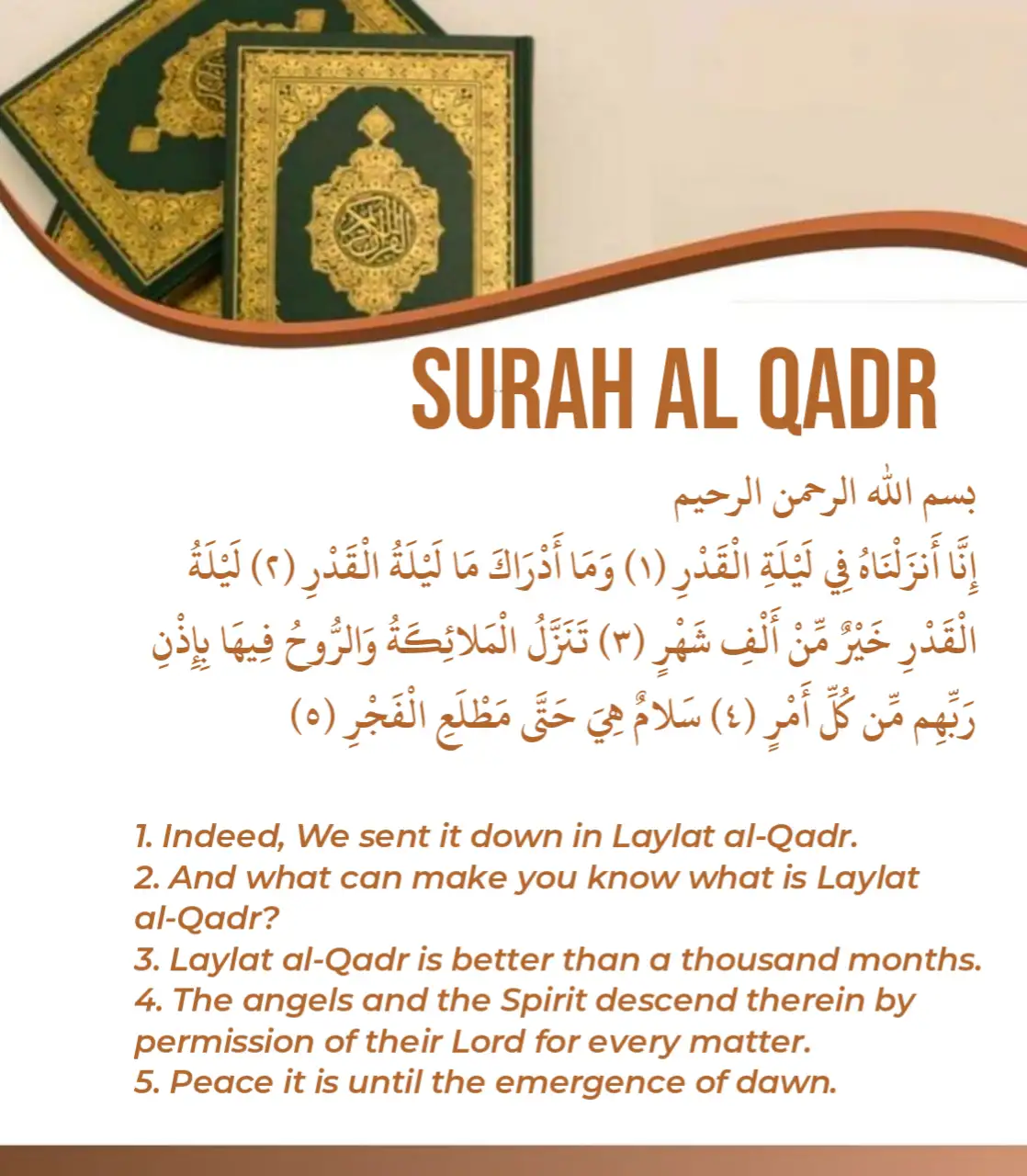
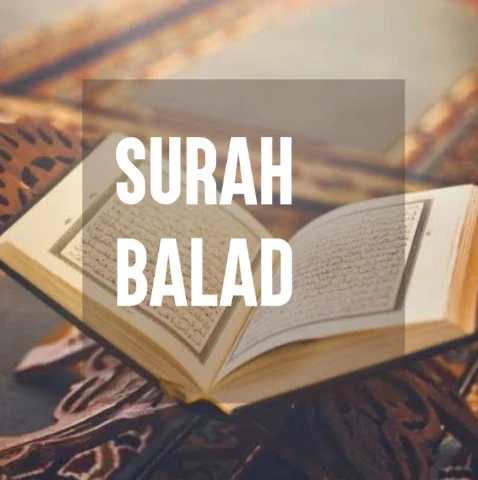
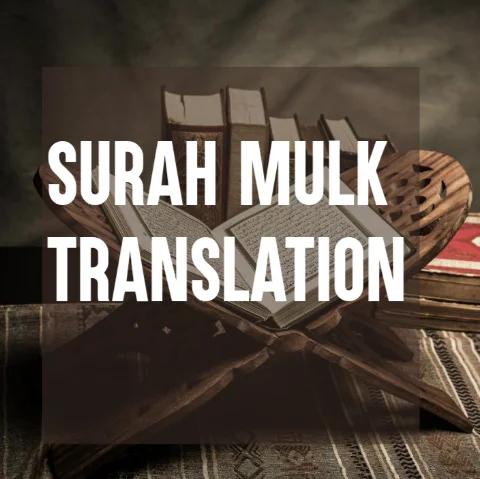
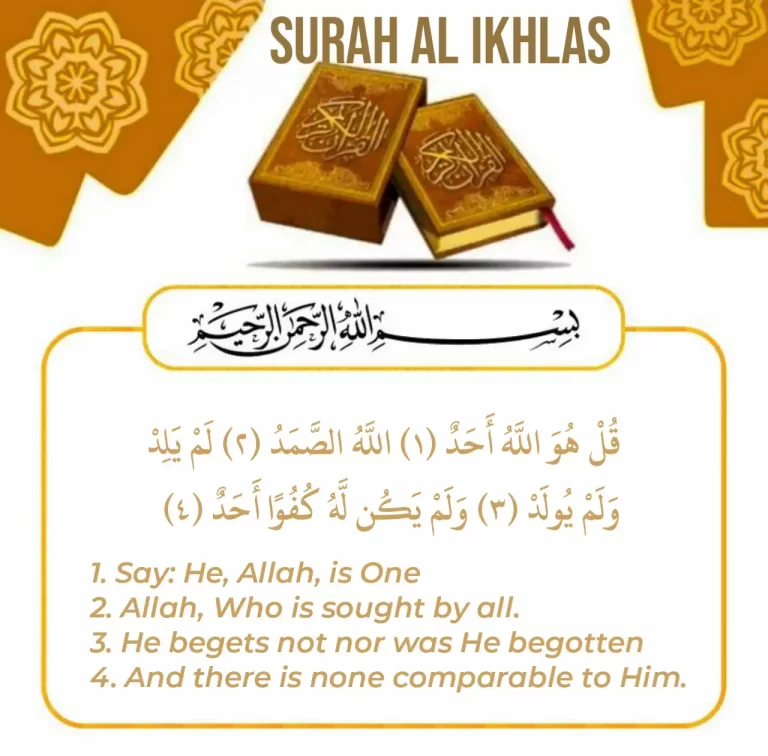
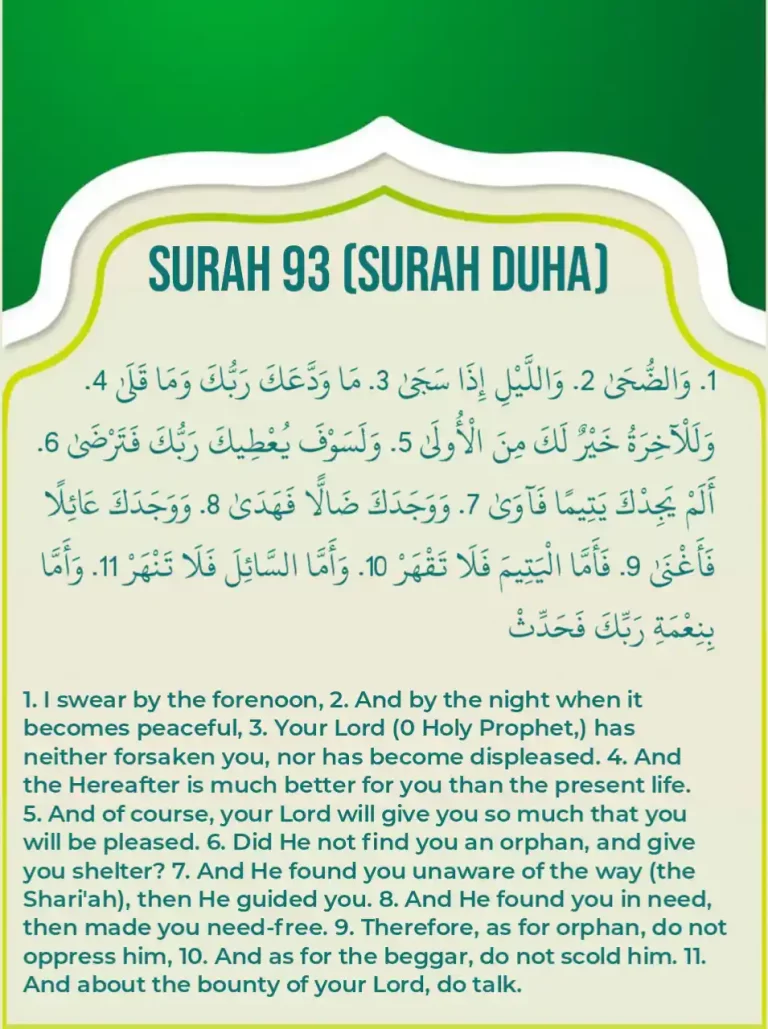
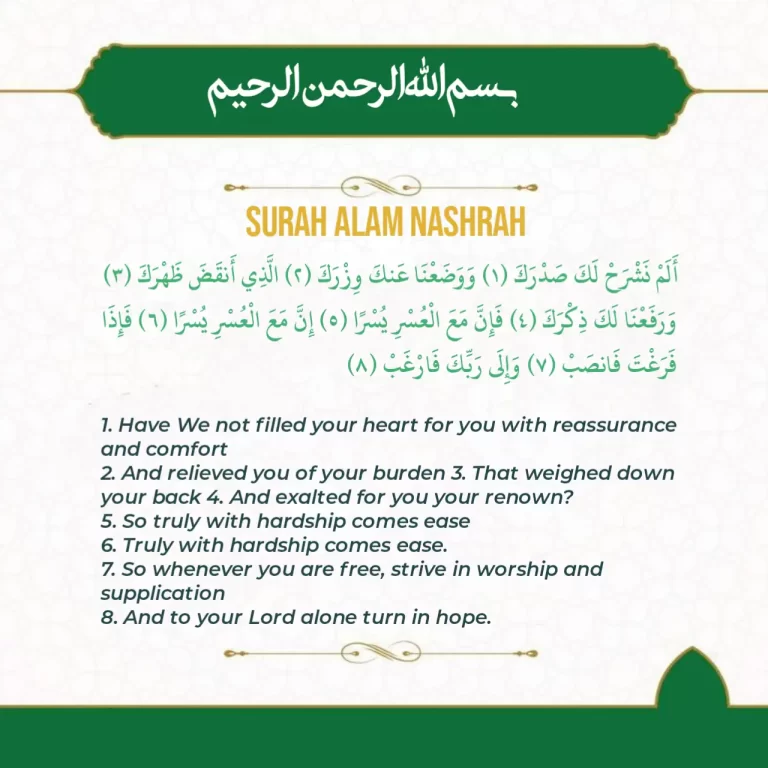
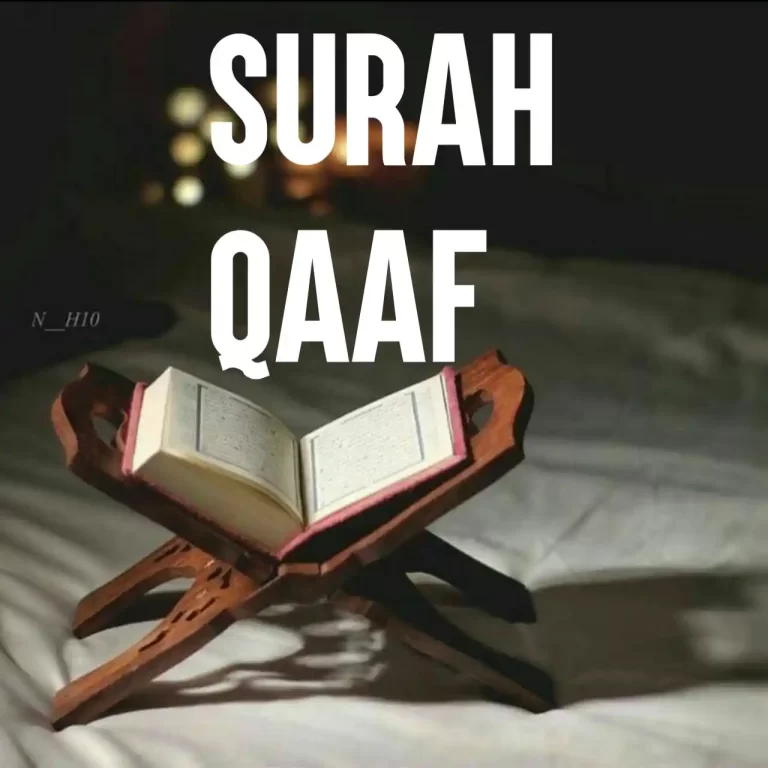
3 Comments